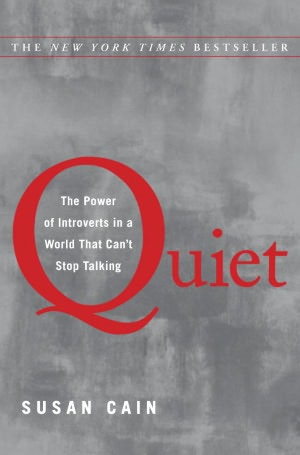
In Quiet Susan Cain explores the different ways introverts
and extroverts relate to the world. She distinguishes shyness from introversion
and demonstrates how both introverts and extroverts can be leaders. Most importantly,
she de-stigmatizes and legitimizes introversion. In a time when children are
criticized for not being outgoing enough and we are all told that we must
continually sell ourselves, Ms. Cain reminds us that wanting a bit of time to
one’s self is not a pathology that needs treatment. She explains that
introverts are not necessarily shy. Shyness, according to Ms. Cain is the fear
of social disapproval or humiliation, and both introverts and extroverts can be
shy. Introversion and extroversion is
more about how one draws energy. Extroverts are energized by and crave
stimulation from others. They thrive in environments where there are lots of
other people to talk to, even if it is just small talk. Introverts can be social
to, but too many people for too long can be overwhelming. Introverts tend to
have rich inner lives and recharge their batteries by taking some quiet time to
themselves when they can let their thoughts and imaginations flow. They tend to think, really think, before they
speak. It is not that one or the other
is better; both types of people are needed in the world. And introversion does not mean one is destined
to be always be a follower instead of a leader. Ms. Cain gives several examples
of introverted leaders, like Gandhi and Rosa Parks, whose understated style
inspired the masses. She notes that a bold and aggressive stances can come
across as reasonable when presented by a mild mannered, understated
personality. Closer to (my) home, she
tells the story of an attorney, who contrary to the stereotypes was not prone
to making grandiose speeches and yelling. In negotiations over a loan, this attorney sat
across a table facing bankers and their more stereotypical aggressive lawyers
across the table. Instead of responding
their speech making in kind, she took the time to listen and respond
thoughtfully to the points posed by the opposing attorney and their clients. In
the end, she not only successfully renegotiated a loan for her client, but
received praise for keeping her cool throughout the negotiations and received job offers from both opposing counsel and
their client!
I cannot recommend this book highly enough. If you are an
introvert, read this book and you’ll realize, if you haven’t already, that
there is nothing wrong about wanting and needing quiet time. If you are an extrovert,
read this book and you’ll understand that quiet people are not being rude or
standoffish, they simply relate to the world in a different way. If you’re a
parent, particularly a parent of a quieter child, please read this book. One of
the most touching stories Ms. Cain tells is about an outgoing mother and her
introverted daughter. The mother was worried when she saw her daughter playing
alone at the end of the school day, but it turned out that the daughter was
just fine. She had friends and generally enjoyed school, but at the end of day
was a bit tired of the constant social stimulation and that alone time at the
end of school was her way of de-stressing. The daughter did not perceive being
alone at the end of the school day as a problem but looked forward to that
time. As an introvert myself, I can totally relate.
No comments:
Post a Comment
I look forward to your comments. Tell me about the books you're reading.